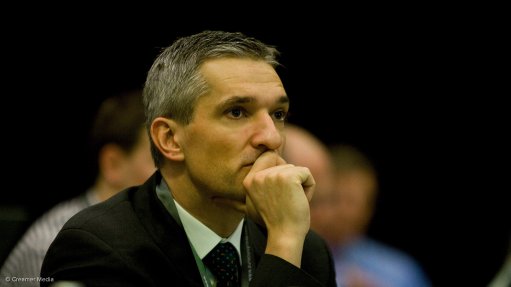
WEC secretary general Christoph Frei
Photo by: Duane Daws
Energy and commodity price volatility and uncertainty remained at the top of the list of concerns confronting global and African energy leaders canvassed for the World Energy Council’s (WEC’s) 2015 World Energy Issues Monitor.
More than 1 000 energy executives and policymakers from nearly 80 countries responded to the survey, which showed energy-price volatility to be the dominant “critical uncertainty” for every region.
For the African energy leaders surveyed the top uncertainties for 2015 were listed as high energy and commodity price volatility, energy subsidies and access to capital markets.
“In 2015, price volatility remains a key concern, demonstrated by the more than 50% drop in price over seven months where a barrel of crude oil (Brent) was priced at $108 in January 2014, reached its peak price of $112 in June, before falling below the $50 benchmark in early 2015,” the report noted.
The WEC anticipates that the oversupplied oil market – triggered by an effective “price war” between Organisation of the Petroleum Exporting Countries and North America and a shift from price control to maintaining market share – will result in a sustained low-price environment.
It also notes that nonenergy commodities are falling in line with plunging energy prices and weaker demand from China.
Secretary general Christoph Frei dubs the volatility as the “new normal” for energy leaders, who will still need to make major investment decisions in the face of unprecedented uncertainty.
Energy leaders also identified the climate framework as a key risk factor ahead of the United Nations Climate Change Conference’s twenty-first Conference of the Parties (COP21), which will be held in Paris, France.
“With COP21 approaching, uncertainty with regards to the future of a universal, legally binding climate agreement is once again high on the agenda.”
Also rising up the league table of uncertainties is the issues of electric storage, which could have a major impact in light of the rising supply of renewable-energy sources, which are expected to quadruple by 2035 and further drive the need for storage facilities.
The WEC cautions that incentives to deliver required storage and back-up capacity for these intermittent energy sources are not strong enough, which is leading to uncertainty.
“We are seeing more emphasis on the need for new electricity market design, which has been in response to the greater unpredictability of supply as a result of the increasing adoption of solar and wind in the electricity mix. Along with the emerging need to better manage data and a greater risk exposure to cyber attacks, these developments have paved the way for new business models,” Frei says.